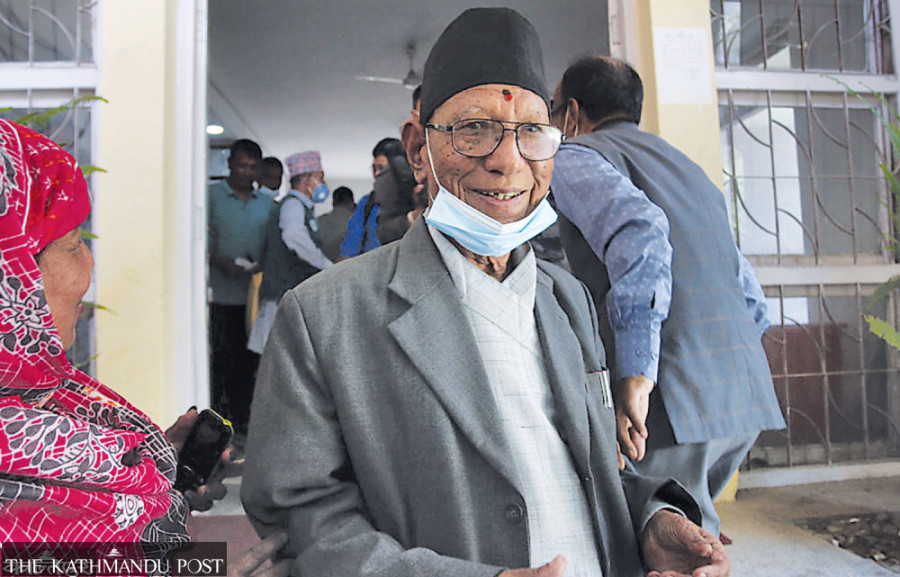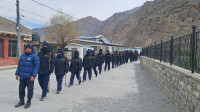Politics
He has been contesting local elections since 1972. He has won every time
Narsingh Byanjankar, 81, has led his ward in Lalitpur for over four decades. He is contesting again as an independent candidate.
Prashant Mali
He first won the ward chair post in 1972. Last he contested was in 2017. He has won every election. He is running for the post this time again. And he is confident he will win.
Meet Narsingh Byanjankar.
The 81-year-old from Ward No. 10 in Lalitpur Metropolitan City has filed his candidacy as an independent candidate for the upcoming local elections slated for May 13.
“In every election, political parties ask me to contest the election on their tickets. But I have my own views about contesting from a particular party,” said Byanjankar, who has resigned as Ward No. 10 chair to contest for the post again. “A ward chair’s job is to serve the people. But after winning on the party ticket, one has to serve party leaders also. That’s why I have decided to run as an independent candidate.”
In 1992, Byanjankar contested on the Nepali Congress ticket, but he was elected unopposed.
“The reason voters have been continuously electing me is that they like me for not endorsing corruption and for working for the people without dilly-dallying,” he said. “A ward office is not a place for politics; it’s a place to serve the people. I still have the hunger for social service.”
In the 2017 elections, his competitor was Karmalal Byanjankar from the Congress. He defeated his rival by 97 votes. Narsingh secured 611 votes, Karmalal 594 and Kul Bahadur Acharya of the CPN—UML secured just 187 votes.
In 1972, Byanjankar led Ward No. 1 in Lalitpur. He had defeated Devendra Lal Amatya by a margin of 422 votes. He was elected again in 1977.
After the referendum in 1980 to choose the system of governance—results, which were said to have been rigged, showed people’s choice for the party-less Panchayat system—he resigned and joined the multi-party democracy movement.
In the local panchayat elections held in 1983, he was elected unopposed. A year later, he resigned after a dispute with the then “pradhan panch”, the head of the local “panchayat”, over the construction of a municipal building.
In the 1985 by-election and again in 1987 in the local panchayat election, he won unopposed.
After the restoration of democracy in 1990, the Congress fielded him in the 1992 local elections. But no one filed a candidacy against him, installing him as the ward chair unopposed. In the 1997 and 2017 elections, he ran as an independent candidate. Nepal held local elections in 2017 after a gap of 20 years under a new constitution promulgated in 2015.
This time, his nephew Rabin Byanjankar from the Congress, Raghu Dulal from the CPN (Maoist Centre) and Bir Bahadur Tamang from the RPP (Rastriya Prajatantra Party Nepal) have filed candidacies against him. The UML has not fielded any candidate.
There are 2,766 voters in Ward No. 10 of Lalitpur Metropolitan City. The ward in Lalitpur is one among the 6,743 wards across the country. Nepal is holding the second local elections since the promulgation of the constitution in a single phase on May 13 to elect a total of 35,211 local level representatives for six metropolitan cities, 11 sub-metropolitan cities, 276 municipalities, 460 rural municipalities and 7,743 wards.
More than 150,000 nominations have been filed for the elections.
Local voters say Byanjankar is humble and helpful.
“Most of those who get elected often act bossy, but Byanjankar works for the people, for the poor,” said 73-year-old Gyanu Bista of Kupondole. “Even if my son contests against him, I will vote for him.”




 19.71°C Kathmandu
19.71°C Kathmandu















